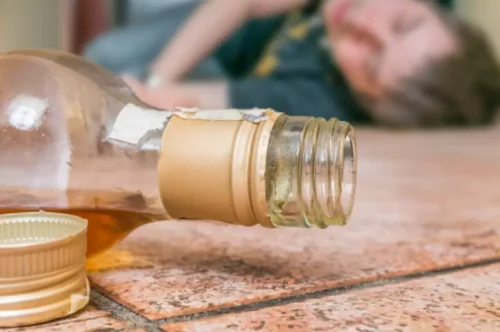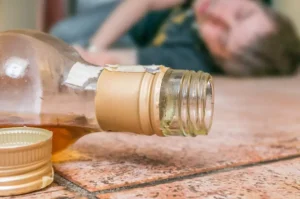How Long Does Alcohol Stay In Your Body?


It is a vital diet ingredient for all individuals recovering from alcoholism. While the body works on metabolising alcohol, it suffers from dehydration. You must increase your water intake after drinking too much alcohol to rehydrate. Alcohol metabolization is commonly caused by two enzymes—alcohol dehydrogenase (ADH) and aldehyde dehydrogenase (ALDH). These chemicals break down the alcohol and allow it to be eliminated from the body’s systems. Once alcohol is in the bloodstream, it can only be eliminated by dehydrogenase, sweat, urine, and breath.


The Time To Get Sober Is Now


Exercise boosts metabolism and circulation, aiding in faster elimination of toxins including alcohol from the body. Activities like jogging, cycling, or brisk walking increase metabolic rate and promote sweating for detoxification. Physical activity promotes sweating, which is another way your body eliminates toxins, including alcohol. Sweating helps remove impurities through the skin, complementing the liver’s efforts to metabolize and eliminate alcohol from your bloodstream. Exercise influences alcohol metabolism by stimulating various physiological processes that assist in breaking down and eliminating alcohol from your system more efficiently. When you work out, your body’s metabolic rate increases, leading to faster processing of substances like alcohol.
Short-Term Effects of Alcohol
While there are ways to support the body’s natural processing of alcohol, there is no shortcut to eliminating it from your system. If you are struggling with excessive drinking and want to take the next step toward an alcohol-free life, the Coleman Method can help you get through the detox and withdrawal process and into recovery. Our outpatient detox program has a 98% completion rate and has helped thousands of patients overcome alcohol dependence and addiction over the Halfway house past two decades. The effects of alcohol on the body are both immediate and long-term, impacting vital organs and functions in ways that can compromise health and well-being. It is essential to be aware of the risks and to monitor consumption to avoid the more severe consequences of excessive drinking. It not only influences your immediate behavior through intoxication, but also poses long-term risks to your brain, liver, and other organs if used excessively.
- Determining exactly how long alcohol is detectable in the body depends on many variables, including which kind of drug test is being used.
- Generally, the older you are, the slower your body will process alcohol.
- This is what causes you to feel light-headed or tipsy after multiple alcoholic drinks.
- However, maintaining good overall health through proper nutrition, hydration, and liver support can promote optimal liver function and thus support the elimination of alcohol over time.
- The occasional hangover may just be the reminder you need to be more mindful of drinking moderately next time.
- Doing so could mean the difference between short-term side effects and long-term consequences.
Understanding Addiction
In the short term, alcohol is processed through your liver in about an hour. Essentially, feeling “drunk” is when your liver becomes too overwhelmed to properly process alcohol, so it overflows temporarily into your bloodstream. This is what causes you to feel light-headed or tipsy after multiple alcoholic drinks. After a night of drinking, you may experience fatigue, queasiness, and low blood sugar.




Assessing the risks and benefits of alcohol consumption remains an active area of research that may lead to major changes in official guidelines or warning labels. Heavy drinking can also cause problems well beyond the health of the drinker — it can damage important relationships. It’s all too common that problem drinking disrupts bonds with a spouse, family members, friends, coworkers, or employers. A saliva test will pick up traces of alcohol up to 48 hours after you stop drinking. If any of the above applies to you, taking that into consideration when drinking can help you moderate your consumption.
- Incorporating regular exercise into your routine not only aids in flushing out alcohol but also improves overall well-being.
- It typically takes a person with a BAC of 0.20 anywhere from 12 to 14 hours to reach sobriety.
- These tests serve as a warning system because they are sensitive to small amounts of alcohol for up to three to five days after consumption.
- Once in the blood, alcohol moves throughout the entire body and eventually ends up in the liver, where most alcohol metabolism occurs.
Alcohol leaves your bloodstream the fastest and will appear on a test up to 12 hours later. Many medications interact with alcohol, either amplifying its effects or interfering with how well your medication works. You should check with your provider if it is safe to drink while taking your prescription. You will also find information about potential interactions with alcohol on the pamphlet that comes with your medication from the pharmacy. When you swallow alcohol, it takes several steps before reaching your bloodstream. Alcohol stays in the urine for 12 to 72 hours, depending on how recently and how much you drank.
Find Support for Abstinence from Alcohol at Confidant Health
Saliva tests can detect alcohol two hours after consumption, and hair tests can detect alcohol for up to 90 days. This length of time usually depends on how recently and how much you drank. Breathalyzers can detect alcohol in your breath up to 24 hours after drinking. As a matter of fact, there are two toxins in alcohol the body has to work hard to eliminate. The form found in most alcoholic beverages is known as ethyl alcohol, which is produced during the fermentation process. Centers for Disease Control and what gets alcohol out of your body Prevention (CDC), alcohol should be consumed in moderation, which means one drink a day for women and two for men — unless your doctor says otherwise.
Recent Posts
Главные черты и плюсы онлайн-казино
Слот-машины автоматы – как играть в онлайн казино-руме с акциями
All Categories
- blog
- 3
- 10600_wa
- mustang-schoenen.be
- 9915_wa
- 10400_sat2
- 10600_sat2
- Ramenbet
- bbrbet mx
- tonybetkasiino.ee
- 11200_prod
- medic
- 1win App 998
- 1xbet Morocco
- 20bet Login 55
- 20 Bet 277
- 10200_prod2
- 9870_sat
- Can You Trade Crypto On Mt5 746
- 10200_sat
- Queen 777 Casino Login Register 244
- New Post
- online casino au
- 1WIN Official In Russia
- www.troikaeditions.co.uk
- 11
- 10080_sat
- www.fortunetiger.com.br
- verde casino hungary
- plinko.name
- tci.ac.nz
- Gama Casino
- Tala888 Legit Philippines 401
- 1win Ofitsialnii Sait 648
- richvillecasino.it – IT
- 888starz bd
- wolf-gold-demo-ca.online
- 9800_sat
- minder-nein.ch
- www.artupdate.nl
- Betfast Apostas 797
- teacherrangerteacher
- Форекс Брокеры
- Форекс обучение
- Горилла Юа
- 5150
- 33
- Parabet casino
- skovoroda.in.ua
- sweet bonanza TR
- Bankobet
- book of ra
- sammlungfriedrichshof
- Play Croco Casino 194
- book-of-dead-slot-nz.online
- dragonslots-casino.de – DE
- Mma Bet E Confiavel 318
- nvcasino-de.net – DE
- CM-CZ-2
- 20 Bet Casino 804
- www.cauciucuribucuresti.ro
- Party Casino Online 279
- 10400_prod2
- IT Образование
- cz
- 1win Brazil
- efps.be
- 44
- 10500_sat
- 10500_sat2
- bizzo casino
- 10050sat
- Bdm Bet Espana 574
- yo-einstein
- sudundsatz
- columbus-deluxe.de
- 9600_prod2
- fire-joker-slot.nl
- nv-casino.com.ro – RO
- Sportaza Entrar 656
- lyrica
- www.rhproperties.es
- Brabet Link Jogo 374
- 10400_prod3
- IT Вакансії
- 4
- Новости Криптовалют
- Plinko
- dobracajovnapardubice.cz
- 10100_sat
- 10500_sat3
- Vovan Casino
- goldspin-casino.de – DE
- Slottica Casino Pl 514
- 5770_tr
- Kasyno
- dragonslotscasino.hu – HU
- izzi
- gonzos-quest-kostenlos-spielen.online
- 20bet Kasyno 327
- 20bet Pl 667
- casinowonaco.fr – FR
- www.sigarenfabrieken.nl
- Betonred App 724
- 20bet Login 330
- Uncategorized
- 1
- 9600_wa
- casino
- Quantum AI
- ganimed.cz
- 6
- Diploms
- wienwin
- casino-betonred.es – ES
- 10050_sat
- fairness-symposium
- king-maker.fi – FI
- bet-riot-casino.de – DE
- az-1xbet.org
- Kudos App 270
- Bdmbet Casino 485
- Bet365 Casino 601
- wolfycasino6.de – DE
- www.serenium-funeraire.fr
- Vegasino Schweiz
- Sumatriptan
- Bussiness
- News
- Forex Trading
- 11000_wa
- 1450
- haciendalabodega.cz
- 10655_pr
- kupit diplom
- 1winRussia
- aviator brazil
- whathappenedtoflightmh17.com
- 10300_sat
- Starda Casino Schweiz
- uz-melbet.org
- 9950_prod
- 10000_prod
- Bono Gratogana 326
- 9800_sat2
- casinowolfy.de – DE
- www.un-film-sur-riquet.fr
- Montecryptos Casino
- 1xbet-games.onlin
- Life Style
- casinò online it
- 1win Turkiye
- 1440
- 10350_wa
- highmoorfarmpark
- 30
- result_1743
- Basaribet
- 10000sat4
- mostbetcasino.live
- 10125_sat
- Aajogo Login 591
- 22bet
- 1xbet-2.com
- 9720_sat
- adobe generative ai 1
- pinup-az.me
- Betano Login App 762
- primexbt-ltd.com
- 10250_sat
- Gamdom Review 456
- Music
- pinco
- 1win India
- 3240
- 9655_wa
- zsolovi.cz
- ElonBet
- 1030i
- slottica
- 10060sat
- sweet bonanza
- slotexo-casino.it – IT
- Betsul Futebol 929
- 1xbet casino BD
- azer1xbet.com
- az-1win.com
- Sportsbet App 917
- pin-up-az.me
- www.sepabelgium.be
- www.weisse-magie.co
- Casinozer Schweiz
- Fansbet Promo Code 631
- Technology
- casino online ar
- a-freewine
- 1win uzbekistan
- betify
- king johnnie
- 31
- 2060
- copies
- 10000sat5
- casibom tr
- Como Jogar No Pagbet 134
- xarelto
- dragonslots-casino.es – ES
- 1winaz
- masterfuegoforestal.es
- Betnacional Baixar 521
- pinup-az.wiki
- www.coronatest-rv.de
- book-of-dead.ca
- Royal Win Online 95
- Gratogana App 860
- New
- casino onlina ca
- covid
- 11700_wa
- Mostbet Russia
- restaurant-icook
- 32
- 336i
- 10000sat3
- Slots
- Pin Up Peru
- 20 Bet Casino 735
- 5240_tr
- Slottica Kontakt 2
- gpt 5 capabilities 5
- pintatucasa.es
- mostbetcasino.ink
- Bdmbet Application 53
- www.churchgrowthresearch.org.uk
- 1win App 688
- 9600_sat
- Mostbet Online 931
- AI News
- Kasyno Online PL
- Hello World!
- 10900_wa
- 8700_wa
- eurosanit.cz
- pe
- 624
- 10000sat6
- sugar rush
- 11100_prod
- azer-1win
- 888starzuz.org
- Gym 222
- Betonred Casino
- crazy time
- mostbetcasino.site
- pinupcasino.me
- 5barricas.valenciaplaza.com
- 22bet-uz.org
- laopcion.com.co
- 1winaz.wiki
- Sober Living
- casino en ligne fr
- –
- ptakoviny-eshop.cz
- 9750_wa
- Education
- it
- bitqt.it
- 10300sat
- 1xbet Russian
- 10110_sat
- cazino1win
- uz-betwinner.org
- echtgeld-casino.at
- Ivibet Schweiz
- shiningcrown.nl
- 20
- Mostbet Casino Bonus 52
- betmatchkaszino.hu – HU
- Onabet Casino 629
- 9600_sat2
- 1winaz.biz
- Bookkeeping
- Software development
- dolmar-makita.cz
- stoms.com.ua (2)
- ricky casino australia
- 10500_wa3
- 10600_prod
- Комета Казино
- 10100sat
- goldstueck-vienna
- pin-up-az.wiki
- mostbetcasinom
- How To Make A Crypto Wallet 978
- 9600_prod
- 1wincasino.vip
- storieumane.gr
- ai bot name 2
- 26
- candyspinscasino.de – DE
- 1xslotsaz.com
- Party Casino Bono Sin Deposito 108
- Stake Casino Schweiz
- FinTech
- ! Без рубрики
- Финтех
- IT Vacancies
- 9500_wa
- 10200_wa
- 10850_sat
- 1Win Brasil
- Qizilbilet
- monika-heusinger
- 20bet Login 446
- Partycasino Espana 513
- Aviator
- Dafabet Login 109
- cazino1win.com
- sugar-rush-1000-nz.online
- 10200_prod
- Winspark 50 Giri Gratis 260
- swiper-casino.fi – FI
- 7games Bet 213
- 10310_sat
- 10000_sat2
- s'ebals9
- 2
- s-drazby
- corporativodehospitales.com.mx
- 9890_wa
- casinos-nongamstop26
- 10550_sat2
- Masalbet
- casino zonder crucks netherlands
- ulrikelunacek
- 10120_sat
- Maribet casino TR
- Parimatch Casino 351
- Betonred Casino Login 708
- Jardiance
- sugar-rush-demo-ca.online
- adobe generative ai 3
- Zet Casino Review 161
- swiperkasino.de – DE
- 7777777
- Olympe Casino France
- 10000_sat

